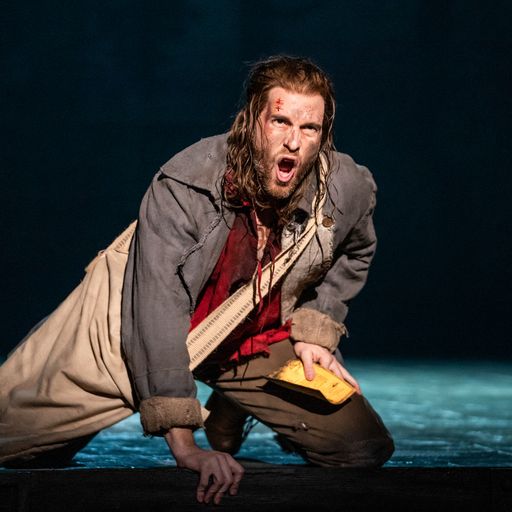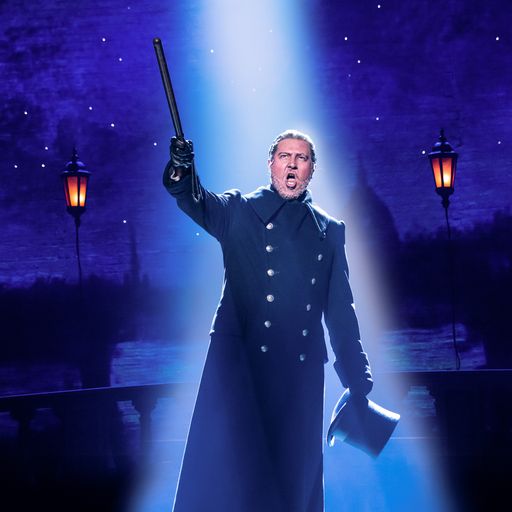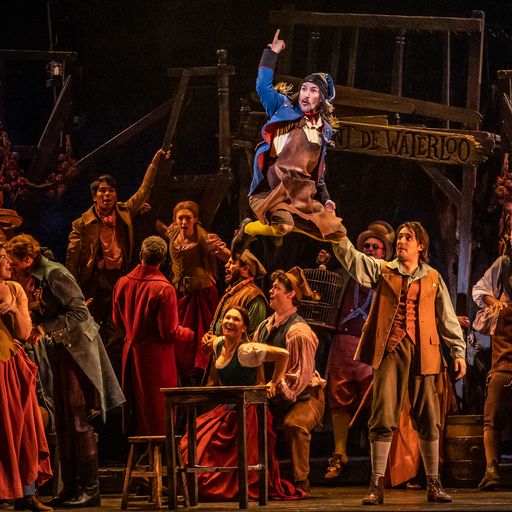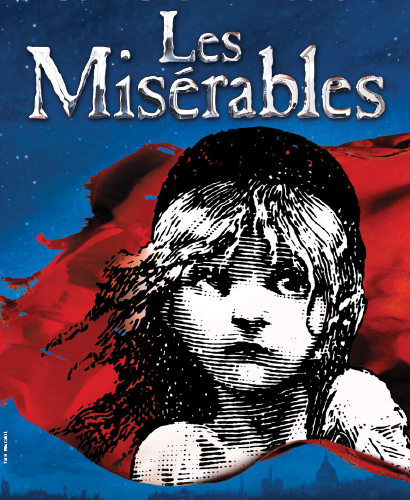By Kathryn Olsen
Broadway at the Eccles is once again bringing the best of 42nd Street to the Eccles Theater in Salt Lake City with Les Miserables, attended by Front Row Reviewers. This 1980 musical by Alain Boublil, Claude-Michel Schonberg, and Jean-Marc Natel was brought to English-speaking theaters in 1985 with Lyrics by Herbert Kretzmer and did not initially gain popularity, but early audiences spread appreciation for it by word of mouth. It won three Tony Awards and the 2012 adaptation won an Academy Award. The underrated musical based on Victor Hugo’s 1862 novel is now the second-longest-running musical in the world. I, myself, saw it as a child in the early years and was thrilled to attend with another fervent fan decades later.

The musical opens as Prisoner 24601, Jean Valjean (Nick Cartell), is paroled after 19 years on a chain gang. He is warned of dire consequences should he break the law again by a guard named Javert (Preston Truman Boyd). Unable to find work or lodging as a dangerous criminal, Valjean accepts shelter and food from a local bishop (Randy Jeter) who helps him escape prosecution when Jean steals the bishop’s silver. The bishop exhorts him to use the silver to become an honest man. Eight years later, factory worker Fantine (Haley Dortch) is forced out of her job for having a child out of wedlock and is later arrested for attacking a man who propositioned her. The mayor intervenes to atone for allowing her dismissal from his factory. Javert, now an officer in the same town, suspects that the mayor has a checkered past, but turns his investigation elsewhere when a man named Jean Valjean is re-arrested. The mayor, guilt-ridden at the thought of this man’s sentence, declares himself to be the former Prisoner 24601. Fantine passes away after entrusting her daughter to Valjean and the former mayor has to fight his way to freedom in order to adopt the orphaned Cosette (Vivian Atencio/Cora Jane Messer). Nine years later, Valjean and Cosette are living in Paris and Inspector Javert is informed that his quarry is within his reach. Valjean, fearing capture, decides to leave the country, but Cosette (Addie Morales) has fallen in love with Marius (Gregory Lee Rodriguez), one of the revolutionary students demanding reforms. He risks his life for the young man who is so important to his daughter. Will he be able to do so without finally being imprisoned by Inspector Javert or will both of them be able to move past his wrong-doings of seventeen years ago?
Cartell’s performance is absolutely worthy of the thunderous applause he was afforded at the end. While most of his vocal performance is warmed by a rich vibrato that brings a flair for the dramatic to the part, his most contemplative parts are sung in such a subdued and humble tone that it is almost monastic by comparison. LIkewise, his emotional transformation from the man who “had come to hate the world” to a righteous man who declares that “to love another person is to see the face of God” is the most effective development of the musical.
Boyd is unforgettable as Javert. The song “Stars,” in which he expounds on his godly inflexibility towards criminals and vows to pursue Valjean with a righteous vengeance, is always an impressive moment in the plot, but Boyd has by this point proved ruthless and vindictive and his manifesto is a show-stopper. It makes the turmoil of his being on the receiving end of the mercy he himself denies others and the justice he admires remarkable.

Fantine and the Bishop of Digne must be assessed together as characters with somewhat brief, but deeply influential roles. The Bishop, who seems to be a 19th-century prison abolitionist or someone who believes in restorative justice, is played by Jeter in a way that makes extraordinary mercy seem to-be-expected while it is actually a miraculous act of generosity. Dortch has a resonance of sound that buries itself in both tragedy and redemption of the character who lives for her child in terrible circumstances.

Madame and Monsieur Thernardier are likewise inseparable, but as an absurdist and malicious contrast to the law and order of Javert and the determined piety of Valjean. Christine Rose Hall brings a playfulness to the role that is sometimes so flamboyant that it seems to be a character within a character and her melodramatic vocal stylings are perfect for the woman who is constantly looking for a way to make her sob stories pay. Ciaran Bowling plays her husband as crass and scheming in equal parts with a progressive twist to his character’s inclinations for those who pay attention and he is as interesting in his corrupt cons as he is as the man who trawls battlefields for treasure and inadvertently saves lives.
Another essential pair is that of Eponine (Christine Heesun Hwang) and Gavroche (Henry Kirk/Milo Maharlika), who are children of the Thenardiers and both street rats involved in the June Rebellion that forms the center of the second act. Kirk has the irrepressible spunk that is essential to the character who is a kind of mascot for the revolutionaries at the barricade. He is unafraid to chase people off in place of the police, but also flips the bird at the traitor Javert once he exposes him as a spy. Eponine, meanwhile, is so powerfully caught between the life of her family’s crimes and her loyalty to the cause that every one of her solos is a kind of turning point. Hwang’s performance of “On My Own” left a ringing echo in the hall that demonstrated an unparalleled vocal power among the cast.
Rodriguez as Marius seems to be a background character for much of his performance, but then develops into a forceful presence. One of the most striking parts of this role is always his mourning ballad of “Empty Chairs at Empty Tables” and in this production, the staging is so minimalist that the apparitions of friends lost is haunting, but he stands alone with glass upraised in the end and this solitary bravery is extremely moving.
Morales plays Cosette in a more earnest and active manner than I’ve seen in other interpretations of this musical and this is what endeared her to me as an actress. There is both kindness and confidence in her approach to her love story with Marius as well as her support in the days when he is struggling to heal. Her relationship to Valjean is one that respects his fatherly wisdom, but expresses a great deal of trust.
Every revolution needs a zealous leader and Devin Archer is the heart and brains of the eventually-doomed rebellion. His organized mind and ringing voice lead the audience to almost believe that he has the willpower to change history.
The children in this production, who play younger versions of central characters or a brief role in group scenes, are consummate professionals for their ages. Little Cosette is played by Vivian Atencio in the performance I attended and Cora Jane Messer, as is Young Eponine. Messer’s performance as the oppressed child who is rescued by Valjean, is as hopeful of a good life as her adult counterpart, while Atencio is the picture of a favored child in contrast to the woman she becomes.
The ensemble of this show is a cast of a thousand faces for the versatility of their roles, whether enjoying drunken fun at the Thenardiers’ or cornering Jean Valjean after his theft of the silver. The students have a distinctively refined choral style at times, while the prostitutes of Paris and the poor are vocally similar. The overall performance speaks of great training and hard work.
The technical staff is as brilliant as is always expected from Broadway at the Eccles and helmed by directors Laurence Connor and James Powell and Resident Director Richard Barth. The most stunning contributions are by the Set and Image Design by Matt Kinley with Associate Set Designers David Harris and Christine Peters and the Lighting by Paule Constable with Associate Lighting Designers Ben Jacobs and Karen Spahn, where a few set pieces can be turned and manipulated to resemble factory floors as well as hidden corners of Paris or the cramped streets where the barricade is built. Projections by Finn Ross and Fifty-Nine Productions with Associate Projection Designers Simon Harding and Jonathon Lyle allow the audience to see the scene set in the sewers of Paris as well as visualize one character’s leap into the Seine. The Original Costume Design by Andreane Neofitou and Additional Costume Design by Christine Rowland and Paul Willis, along with Wigs, Hair and Make-Up Designer Stefan Musch, are period-appropriate and distinctive between classes and allegiances. Sound by Mick Potter and Associate Sound Designer Nic Gray is essential and extremely well-done, whether highlighting the countryside sounds of rural France or providing the jarring blasts of cannons and rifles during the brief insurrection. Stage Managers Jack Mcleod, Ryan W. Gardner, Claire Farrokh, and Tiffanie Lane are largely responsible for how well the show flows, while the orchestra conductor Brian Eads was masterful in bringing the best of the remarkable musicians’ work to the forefront of the accompaniment.
This is a performance for young and old, but parents should be aware of the violence presented onstage as well as the mature themes such as sex work, suicide, and crime.
Les Miserables is playing through July 2, so there is still plenty of time to buy tickets. Make your way to the barricade for a night of one of the greatest stories ever told.
Broadway at the Eccles Presents Les Miserables; Music by Claude-Michel Schonberg, Lyrics by Herbert Kretzmer, Original French text by Alain Boublil and Jean-Marc Natel, Based on the novel by VIctor Hugo.
The Eccles Theater, 131 S Main St, Salt Lake City, UT 84111June 20-July 2, 2023, See website for performance times and special presentations with Audio Description, Closed Captioning, or ASL interpretation.
Tickets: $125-275
www.saltlakecountyarts.org/venues/eccles-theater/
Contact: (385) 468-1010
Broadway at the Eccles Facebook Page


0 Comments